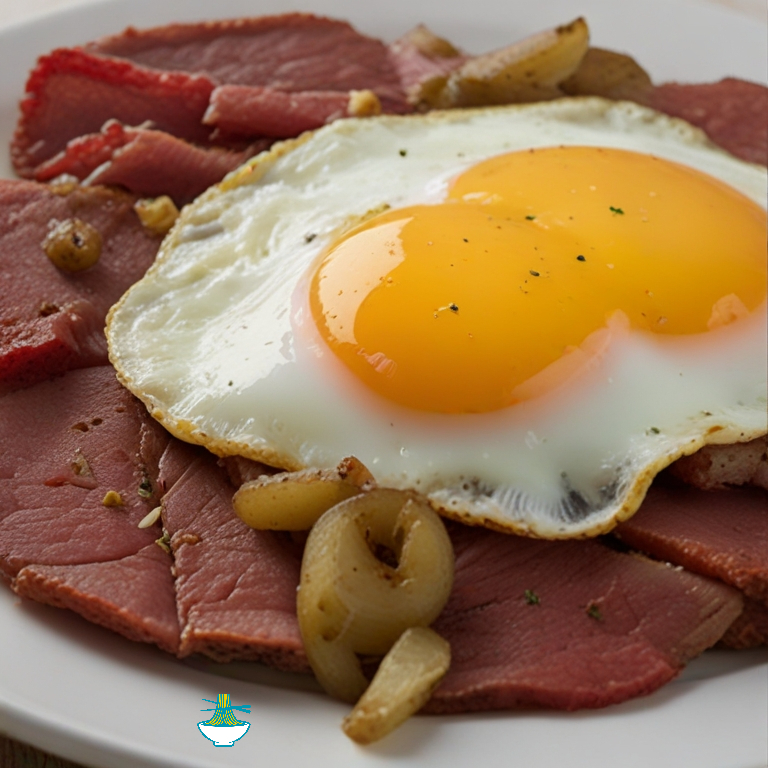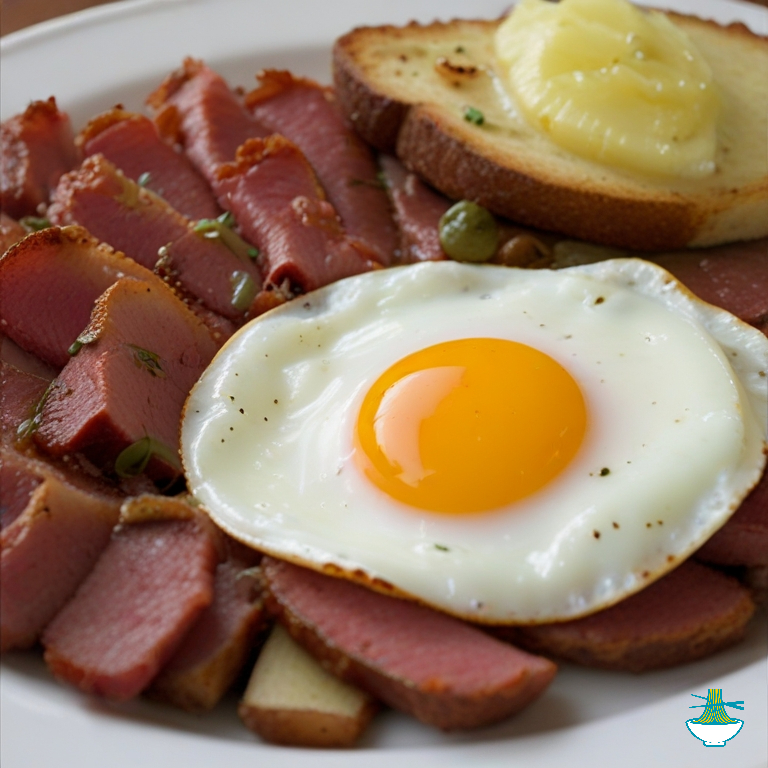Indulge in the flavors of maritime history with Germany's beloved Labskaus. This iconic dish, originating from Northern Germany, offers a delightful fusion of flavors and textures. Traditionally prepared with a base of salted meat, potatoes, onions, and beetroot, Labskaus promises a satisfying blend of savory and slightly sweet notes. Often served with a fried egg and pickles on the side, this hearty dish has been cherished by sailors and landlubbers alike for generations. Discover the essence of German seafaring culture with every spoonful of Labskaus, a culinary voyage worth savoring.
Here's a traditional recipe for Germany's Labskaus:
Ingredients:
- 500g corned beef
- 4 large potatoes
- 2 onions
- 2-3 pickled beetroot (optional, for color and flavor)
- 4 eggs
- Butter or oil for frying
- Salt and pepper to taste
- Pickles, gherkins, or pickled herring for serving (optional)
 Instructions:
Instructions:
1- Peel the potatoes and cut them into small cubes. Place them in a pot, cover with water, and bring to a boil. Cook until the potatoes are tender, then drain and set aside.
2- In a separate pot, cover the corned beef with water and bring to a simmer. Cook for about 1-2 hours or until the meat is tender. Once cooked, remove the meat from the pot, reserving the cooking liquid, and allow it to cool slightly. Shred or finely chop the corned beef.
3- Peel and finely chop the onions. In a large skillet or frying pan, heat some butter or oil over medium heat. Add the chopped onions and sauté until soft and translucent.
4- If using pickled beetroot, finely chop them and add them to the skillet with the onions. Sauté for a few minutes to incorporate the flavors.
5- Add the shredded corned beef to the skillet with the onions and beetroot. Mix well to combine.
6- Gradually add the cooked potatoes to the skillet, mashing them slightly as you mix them with the beef mixture. Continue cooking and stirring until everything is well combined and heated through. If the mixture seems too dry, you can add a splash of the reserved cooking liquid from the corned beef.
7- Season the Labskaus mixture with salt and pepper to taste.
8- In another pan, fry the eggs to your desired doneness.
9- To serve, spoon the Labskaus onto plates and top each portion with a fried egg. Serve with pickles, gherkins, or pickled herring on the side, if desired.
Enjoy your traditional German Labskaus, a hearty and satisfying dish perfect for sailors and landlubbers alike!
Nutritional Values:
Here are the approximate nutritional values for the main ingredients used in the Labskaus recipe per 100 grams:
Corned beef:
- Calories: 250 kcal
- Protein: 25 g
- Fat: 17 g
- Carbohydrates: 0 g
- Fiber: 0 g
- Sugars: 0 g
- Sodium: 1,000 mg (may vary depending on brand and preparation)
benefits:
- Excellent source of protein, which is essential for muscle repair and growth.
- Provides important minerals such as iron and zinc, which are necessary for healthy blood circulation and immune function.
Potatoes:
- Calories: 77 kcal
- Protein: 2 g
- Fat: 0 g
- Carbohydrates: 17 g
- Fiber: 2 g
- Sugars: 1 g
- Sodium: 6 mg
benefits:
- Rich in carbohydrates, providing a good source of energy for the body.
- High in fiber, which aids in digestion and helps maintain a healthy digestive system.
- Contains vitamin C, potassium, and B vitamins, which are important for overall health and well-being.
Onions:
- Calories: 40 kcal
- Protein: 1 g
- Fat: 0 g
- Carbohydrates: 9 g
- Fiber: 1.7 g
- Sugars: 4.7 g
- Sodium: 4 mg
benefits:
- Low in calories but high in antioxidants, particularly flavonoids and sulfur compounds, which may help reduce the risk of chronic diseases such as heart disease and certain cancers.
- Contains prebiotic fibers that promote the growth of beneficial bacteria in the gut, supporting digestive health.
Eggs:
- Calories: 155 kcal
- Protein: 13 g
- Fat: 11 g
- Carbohydrates: 1.1 g
- Fiber: 0 g
- Sugars: 1.1 g
- Sodium: 124 mg
benefits:
- Excellent source of high-quality protein, which is important for muscle building and repair.
- Rich in vitamins and minerals such as vitamin D, vitamin B12, and selenium, which play crucial roles in various bodily functions including bone health, red blood cell production, and thyroid function.
Please note that these values are approximate and can vary depending on factors such as cooking methods, specific brands/products used, and ingredient proportions. Additionally, the nutritional values do not include any additional ingredients like butter, oil, or pickles that may be used for cooking or serving.


Comments